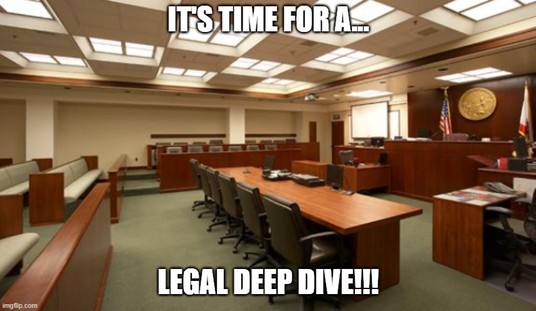Despite the Left’s best efforts, Brett Kavanaugh has been confirmed to the Supreme Court. They’ve moved past denial for the most part, but they’re definitely still stuck on a mix of anger, bargaining, and depression. Acceptance is just a pipe dream.
Case in point, this take from the Smartest Thinkers at Vox:
The case for abolishing the Supreme Court https://t.co/WJU1Nxa1LQ
— Vox (@voxdotcom) October 12, 2018
Sean Illing had a “conversation” with Harvard Law prof (!) Mark Tushnet. The whole thing’s a train wreck, but since we can’t post it in its entirety, here’s a particularly horrendous excerpt:
Sean Illing
I’m tempted to ask for examples of bad decisions, but let’s focus on the case for abolishing the Supreme Court, or at the very least for abolishing judicial review, which is the Court’s ability to decide whether a law by the government is constitutional.
Mark Tushnet
There are two components of the case for getting rid of judicial review. One is that, as a matter of basic democratic principle, the people ought to be able to consider policies and then vote on them without having the courts step in and say “no.” So from a democratic point of view, it’s hard to justify allowing the courts to single-handedly overrule popular will whenever they choose.
The second component is that judicial review may actually impair the public’s ability to engage in serious thinking about what the Constitution means, and what we want to do in light of what we think our Constitution says. In a way, the Supreme Court simply takes on this conversation for itself, and leaves the citizenry as bystanders.
If Illing or Vox had any brains, they’d’ve shut that “conversation” down right then and there. Unreal.
The Supreme Court worked perfectly from 2009-2016. https://t.co/XLAhll4oHF
— Cuffy (@CuffyMeh) October 12, 2018
Haha! "When we don't get our way everything needs to be dismantled." https://t.co/CSzYYOOMPO
— Doug Powers (@ThePowersThatBe) October 12, 2018
The idea that Vox would structure this as a conversation with *Mark Tushnet* of all people (who famously rhapsodized how the Left would be able to use the courts & SCOTUS to "shoot all the survivors" after 2016 b/c he assumed HRC would win) is galling. https://t.co/iF6Zens1PI
— Jeff B. (@EsotericCD) October 12, 2018
MARK TUSHNET, 2016: Oh man it's gonna be grrrrreat to seize a majority on SCOTUS we are going to slaughter our enemies in the culture wars I am *frothing at the mouth with anticipation*.
MARK TUSHNET, 2018: On second thought, judicial review is kind of a bad idea isn't it.
— Jeff B. (@EsotericCD) October 12, 2018
"The Reichstag should be abolished and/or torched." – 1930s Voxosphere
— Cuffy (@CuffyMeh) October 12, 2018
— Dakota (@skeeta_bird) October 12, 2018
Well, it turns out that Vox has actually got some pretty stiff competition.
Vox: We're going to publish the dumbest and most historically ignorant piece you'll read today.
Slate: Hold my beer. https://t.co/xLrLnwJqj2
— Patrick Nonwhite (@NonWhiteHat) October 12, 2018
Ladies and gentlemen, Slate:
The Supreme Court is a historically regressive and presently expendable institution: https://t.co/TFB4AZqmWj pic.twitter.com/CWcc1WboOK
— Slate (@Slate) October 12, 2018
Christopher John Sprigman concludes:
The reality is that the court has never been a progressive institution. And it’s not going to be one for the foreseeable future. In particular, the courts aren’t going to save us from the GOP’s voter suppression efforts—it is, in the end, voters who are going to have to protect the right to vote. And in states where voter suppression efforts go hand in hand with popular Republican legislative majorities (and sometimes unpopular but gerrymandered legislative majorities), voters will not be willing or able to turn the tide. The only way to address that will be for the Department of Justice to get back into the business of enforcing voting rights, and that will require new legislation and Democratic control of the executive branch. Again, the courts aren’t going to help. Nor are the courts up to the job of protecting us from a determined turn by the GOP—or, for that matter, by some future left-wing demagogue—toward authoritarianism. The surest protection against undemocratic politics is a vibrant culture of democratic politics.
Ultimately, the left would be well-advised to get over its unrequited crush on courts and judicial review, as well as the delusion that our old, terse Constitution has much to say about modern problems. It does not, and in any event, too much constitutionalism, like too much democracy, can be dangerous to self-governance and can even destroy a society. The surest and most durable route to progressive change is through the ballot box, and not the courthouse doors.
The question, then, becomes how to shrink the power of courts. There are many valid ways to accomplish that—even without amending the Constitution itself.
Yeah, eff that old, terse Constitution and its stupid Bill of Rights and stuff.
2010, Dems lose Congress: "This gerrymandering thing has got to go!"
2016, Dems lose Presidency: "The Electoral College is nonsense!"
2018, Trump appoints Kavanaugh: "Why do we even have a Supreme Court?"This three branches of government thing is just sooo passe, apparently. https://t.co/c3mzanFSdl
— Emily Zanotti (@emzanotti) October 12, 2018
When leftists don't get their way they speak of packing the court and now they want to abolish it. First Vox, now this. FFS, grow up. https://t.co/NVw4dw6p0O
— Spooky Ginger (@mchastain81) October 12, 2018
This is what progressives are saying now. What will they say if Trump replaces Ginsburg? H/t @RantyAmyCurtis. https://t.co/NhQ5O3cdwh
— Varad Mehta (@varadmehta) October 12, 2018
They won’t say anything. They’ll just slowly shrink and transform into corncobs.
You guys are really, really sore losers. https://t.co/aIwFZ3Vgsb
— Amy Curtis (@RantyAmyCurtis) October 12, 2018
The sorest and loser-iest.
Yep, the talking points have gone out and they are all writing ? https://t.co/wUrDS3ARCI
— Persnickety (@Dawnsfire) October 12, 2018
So, @Vox and @Slate have both done think pieces on how the SCOTUS should be abolished.
This will percolate up to @washingtonpost and @nytopinion by the end of the day, and will be a weekend topic on @CNN and @MSNBC Sunday shows.
Remember who said it.
— Ordy's Amish Pumpkin Spice Butter (@OrdyPackard) October 12, 2018
Oh, don’t worry. We will.
*loses court battle*
"The Case for Abolishing the Supreme Court"*loses election*
"The Case for Abolishing Democracy"*loses at Candyland*
"The Case for Abolishing Board Games"*is just a loser*
"The Case for Abolishing Humanity"— Frank J. Fleming (@IMAO_) October 12, 2018
























Join the conversation as a VIP Member